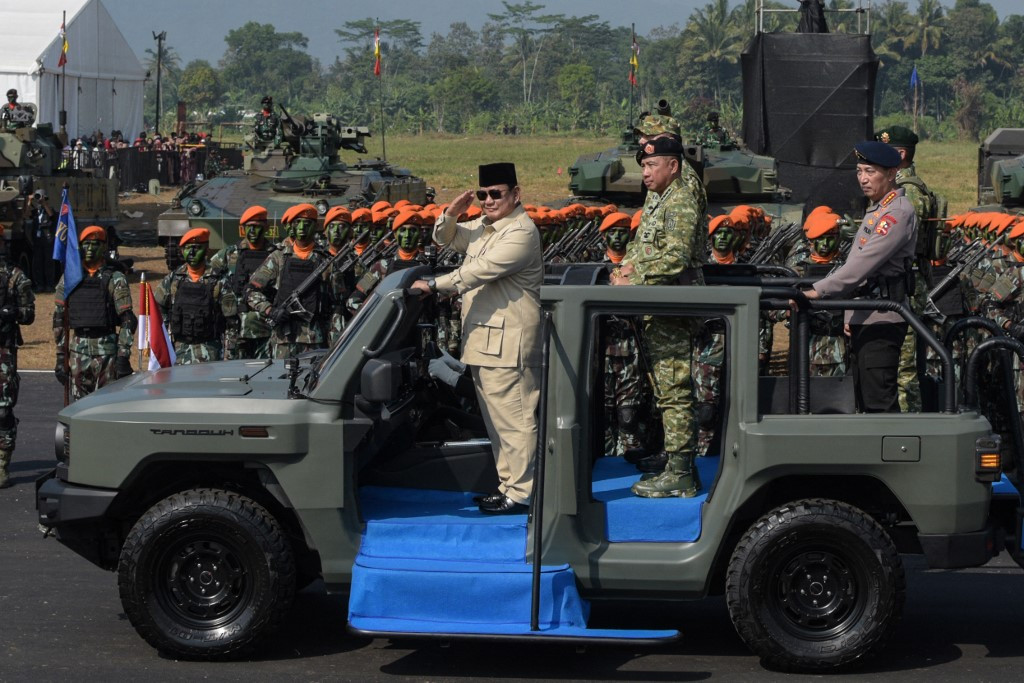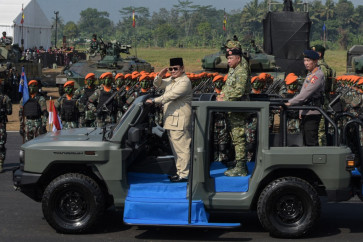Popular Reads
Top Results
Can't find what you're looking for?
View all search resultsPopular Reads
Top Results
Can't find what you're looking for?
View all search resultsHow Prabowo’s Indonesia can avoid a regional security dilemma
Indonesia's military expansion risks sparking a security dilemma, where defensive measures are misperceived as aggressive, potentially unsettling Southeast Asia’s delicate balance
Change text size
Gift Premium Articles
to Anyone
 President Prabowo Subianto (left) inspects troops from a vehicle on Aug. 10 during the Operational Troops and Military Honours ceremony as he inaugurates commanders of the Special Forces Command (Kopassus), Marine Corps and Air Force Quick Reaction Command (Kopasgat) at the Suparlan Airfield in Bandung, West Java. (AFP/Timur Matahari)
President Prabowo Subianto (left) inspects troops from a vehicle on Aug. 10 during the Operational Troops and Military Honours ceremony as he inaugurates commanders of the Special Forces Command (Kopassus), Marine Corps and Air Force Quick Reaction Command (Kopasgat) at the Suparlan Airfield in Bandung, West Java. (AFP/Timur Matahari)
P
resident Prabowo Subianto’s sweeping military restructuring, unveiled on Aug. 10, marks a transformative shift in Indonesia’s defense strategy, driven by the need to address escalating global tensions from Europe to the South China Sea.
The establishment of new military units backed by a 2025 defense budget of Rp 247.5 trillion (US$15 billion)—a nearly 50 percent increase—and new advance weapons acquisitions like Turkish KAAN fighter jets and ballistic missiles, aim to strengthen Indonesia’s resilience against threats like separatism and natural disasters.
Yet, this expansion risks sparking a security dilemma, where defensive measures are misperceived as aggressive, potentially unsettling Southeast Asia’s delicate balance. The integration of advanced technologies, as seen in the United States’ Operation Midnight Hammer, and a shift from Java-centric to distributed military deployments underscore the strategic stakes, necessitating defense diplomacy rooted in confidence-building measures (CBMs) and non-provocative defense (NPD) protocols to maintain regional harmony.
The Indonesian Military’s (TNI) restructuring introduces six new Army military regional commands (Kodam) in Sumatra, Kalimantan, Sulawesi and Papua, expanding the army’s territorial oversight and operational reach.
The expansion extends to the other branches of the TNI. The Navy has been strengthened with the establishment of 14 naval regional commands (Kodaeral), geographically dispersed from Belawan in the West (Kodaeral I) to Sorong in the East (Kodaeral XIV), enhancing maritime security and surveillance capabilities across the vast archipelago.
The Air Force has also seen a significant reinforcement with the creation of three new air force regional commands (Kodau) and one air operations command.
Further augmenting the TNI’s capabilities are a host of new specialized and territorial units, including six special forces command (Kopassus) groups, 20 territorial development brigade, one marine infantry brigade, one quick reaction forces corps (Kopasgat) regiment, 100 territorial development battalions and five marine infantry battalions.

















